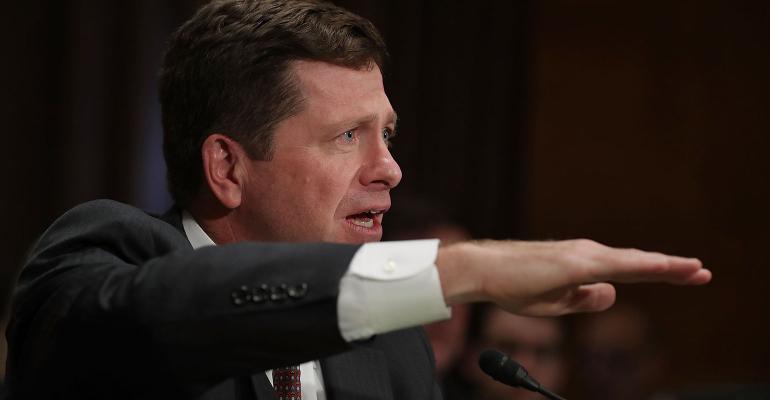The SEC approved opening a public comment period for a proposed exemption that would allow individuals to solicit accredited investors on behalf of issuers in certain instances without registering as brokers. While supporters, including Chairman Jay Clayton, said the exemption would help small businesses to raise capital, critics on the commission worried the rule would only further expand activity in less transparent private markets.
In his remarks during yesterday’s open meeting, Clayton said the regulatory status of such “finders” was a long-standing issue stretching back decades. Clayton said the concerns derived from issuers not knowing when they could work with a finder that was not registered as a broker/dealer, and the regulatory murkiness made potential finders uncertain what kind of role they could play when introducing potential investments.
“The current patchwork of staff guidance and no-action letters in this area has not provided needed clarity, and the time for Commission action is overdue,” he said.
The proposed rule would create two “tiers” of finders who could be exempt from having to register. Under Tier I, a finder could provide contact information of potential investors only in connection with a single capital raise by one issuer in a 12-month period, without being able to make contact with investors themselves. Tier II finders would be allowed to solicit investors, but their ability to do so would be limited to identifying, screening and contacting investors, distributing issuer offering materials and discussing the information in those materials, and arranging or participating with meetings between issuers and investors.
The rule stipulates that a Tier II finder could qualify for the exemption from registration only if they do “not provide advice as to the valuation or advisability of the investment.” But that limitation was one of "form over substance," according to Commissioner Allison Herren Lee, who is against the change. She joined Commissioner Caroline Crenshaw in voting against moving the proposal into a public comment period.
“Imagine a discussion in which a finder, who stands to gain proportionately for every dollar invested, finds an investor, teams up with an issuer to present offering materials and analysis, and sings the praises of a proposed investment,” she said. “All she needs to do to avoid registration is refrain from concluding the presentation with the words ‘you should invest.’ The issuer itself can handle that last step, if it is even needed.”
But the lack of clarity has had calamitous effects on issuers and investors alike, according to Commissioner Elad Roisman, who joined Clayton and Commissioner Hester Peirce in support of the rule. An issuer may be reluctant to join with a finder absent certainty on their regulatory standing, but without finders, investors may never know about the investment opportunities. The three supporters on the commission all stressed the potential impact the exemption could have for small businesses seeking capital.
“There has been a lot of discussion recently about how certain small businesses and entrepreneurs historically have been underserved by venture capital funding or angel investors, either due to their geographic location or founder demographics,” Roisman said. “Yet I think we can all agree that these businesses and entrepreneurs are no less deserving of growth opportunities than those that may have connections to well-established funding networks.”
Notably, finders could solicit only accredited investors (or those they reasonably believe are accredited investors) to qualify for the exemption. Accredited investors were originally considered those having at least $200,000 in annual income or more than $1 million in net worth. In August, the SEC approved a new definition that would allow individuals to qualify if they had “certain professional certifications, designations or credentials,” including Series 7, 65 and 82 licensees.
The rule change also means SEC- and state-registered investment advisors are considered accredited investors.
Crenshaw and Lee opposed that rule change, arguing that it did not account for inflation in the 28 years since the original income and net worth hurdles were enacted, and doing away with them was a risk given poor oversight and transparency in private markets.
In today’s ruling, Crenshaw criticized the fact that this new rule meant finders would not be subject to Regulation Best Interest, or other rules concerning disclosure, supervision and compensation. She also questioned why the commission continued to encourage further activity in private markets without “sufficient ability” into how they worked.
“I cannot support deliberately expanding markets that even our expert staff cannot accurately assess or analyze,” she said. “This is particularly true given that what we do know about the private markets indicates that when compared to public markets, they are less liquid, impose higher transaction costs, are more susceptible to valuation errors, and are more prone to fraud.”
However, concerns about investor protections may be unwarranted, Max Schatzow, an attorney with Stark & Stark’s Investment Management and Securities Group and the author of the investment adviser blog AdviserCounsel, said. The rule permits finders to work only with accredited investors, who tend to be wealthier, sophisticated and less in need of Reg BI’s protections.
Even in the case of Tier II finders, Schatzow surmised that investors interested in these types of options are looking to make riskier investments and are seeking opportunities, not relying on finders as financial advisors who are providing them with investment advice. Like Clayton, he found SEC action on the issue to be long overdue.
“There’s so much of this activity going on already; there’s so many people acting as unregistered finders,” he said. “This provides clarity and even some enhanced protections in this area that’s largely been the Wild West.”
After the proposed rule is posted in the Federal Register, there will be a 30-day public comment period.





